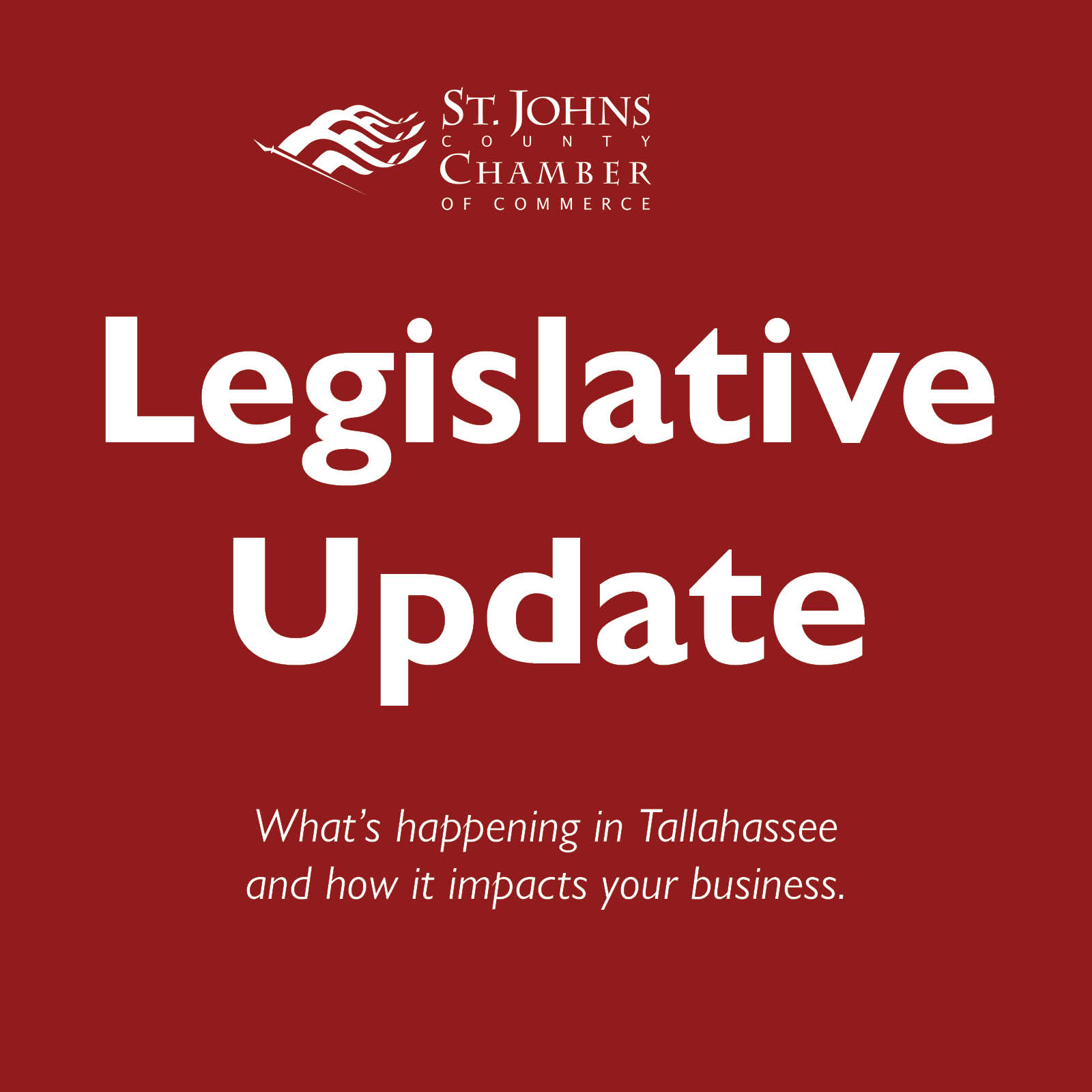2024 Legislative Session Wrap-up | March 2024

The 2024 Legislative Session is in the books and all attention now turns to Gov. Ron DeSantis, who over the next three months will receive and review the FY 2025 Florida budget and numerous other bills approved by the Florida Legislature before their adjournment on March 8. Following is a recap and highlight of major issues the St. Johns County Chamber of Commerce has actively engaged with over the past three months.
Legislature approves $117.5B budget for FY 2025
The Florida House and Senate agreed on a $117.5 billion budget and are in the process of sending the legislation to Gov. DeSantis. The legislature also approved a $1.5 billion tax package that includes:
- $500 million in savings on exemptions on property insurance taxes and fees.
- The creation of a childcare tax credit to incentivize businesses to assist their employees with childcare costs.
- Four distinct sales-tax free holidays estimated to save Florida consumers nearly $290 million.
Business Rent Tax
Initially, the Florida House proposed an additional .75% cut in the business rent tax good for one year only (2025) and the Senate countered with a proposal pushed by Gov. DeSantis to exempt certain property insurance policies from taxes and fees for one year. The Senate position ultimately prevailed. Nevertheless, the business rent tax is still scheduled to drop from its current 4.5% down to 2% on June 1, 2024. The SJC Chamber in 2021 strongly supported the legislature’s action to reduce the business rent tax from 5% to 2% by summer 2024.
Why does this matter? This significant reduction allows for reinvestment back into local communities, businesses, and Florida’s workforce.
Tourist Development Tax Referendum/Discretionary Sales Tax Referendum
Notably absent from the final tax package was an onerous provision requiring periodic re-approval of tourist development taxes by local voters, which was a priority of the Florida House. The tourist development tax (also known as the “bed tax”) is paid primarily by out-of-county tourists on each night they stay in a hotel or other lodging facility. The revenue, which exceeded $20 million in FY 2023, is used by the county and the Visitors and Convention Bureau to promote tourism to the area, support beach replenishment and provide many other services in the county. The SJC Chamber voiced strong opposition to the House provision and after discussing the issue with Rep. Cyndi Stevenson, she spoke against the measure during a pivotal Ways and Means Committee hearing.
Why does this matter? St. Augustine, Ponte Vedra and St. Johns County as a whole rely on the tourist development tax to bring in more tourists who in turn spend millions each year and pay the “bed tax” on their stays in the area. These taxes are collected from predominantly tourists, not county residents.
Visit Florida funded at $80 million annually
After many years of fighting this annual funding battle, the Florida House and Senate have agreed to fund Visit Florida at $80 million for the next few years. Visit Florida co-op funding, along with our local county tourism efforts, helps bring visitors to St. Augustine, Ponte Vedra and the Beaches.
Why does this matter? The tourism industry is the largest single component of St. Johns County’s economy, employing thousands of people and contributing millions in tax dollars annually. Visit Florida’s assistance during and after hurricanes Matthew and Irma and the COVID crisis helped our St. Johns County tourism sector survive and thrive. The St. Johns County Chamber of Commerce has been an active and vocal supporter of Visit Florida for many years.
Live Local Act-related bills
SB 328 and HB 1239 prohibit cities and counties from restricting the floor area ratio as well as density for Live Local proposed developments. Both bills:
- Authorize cities and counties to restrict the height of proposed developments under certain circumstances.
- Make remedial and clarifying changes to property tax exemptions granted by the Live Local Act.
- Appropriate $100 million to the Florida Housing Finance Corporation for the Hometown Heroes Program.
- SB 328 was unanimously passed by the Senate and reconciled with HB 1239 and approved by the House by a vote of 112-1, and sent to the governor for his signature.
